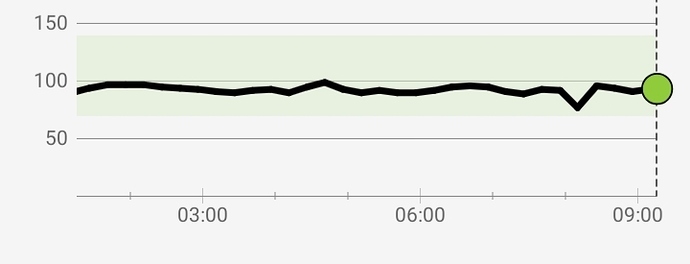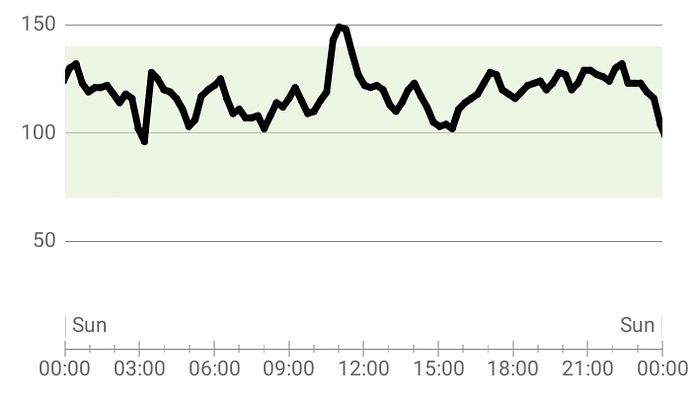Yes, I’ve noticed this too, @SunnyNC, in the Virta site! I’d call it lack of transparency.
Anyway, I came back to report something amazing. So, the day before yesterday, my OMAD was lots of carbs. The chickpea meal.
Yesterday, I’ve noticed my glucose was a bit different in the morning. In the middle of the night, it went close to 70 once and it was up and down, but small amplitude. Bad, but somewhat less jumpy. Then I wanted to eat carbs as soon as possible. I wasn’t hungry, but I wanted to have breakfast, to test the carb thing.
But I only found time to eat at about 15h. My work can be very intense. I had 2 zucchinis cooked in water with lots of spices, 150g of soft goat cheese (or was it sheep? I can’t remember). I had tea after the meal, two drops of a stevia liquid sweetener. I made a chocolate mug cake with 1 tsp of coconut flour and 45% cream, pure cocoa powder and 5 stevia drops, 1 egg. I covered my mug cake with… about 15g of jam. Jam normal people eat, with sugar. I also had about 100g of greek yogurt and about 20g of 70% chocolate. While keto, I’d never splash like this, no way! No sugar, no 70% chocolate, no 2 whole zucchinis in a meal.
Well, my glucose went up to 126, from about 105, or 106. After the meal, it went down… to just below 100! I couldn’t believe it!
In the evening, I went for a walk with sprints later. I walk about 30 min, then I do 30 min of sprints/walk. It’s a HIIT thing. And then I walk home, about 30min. I cut it short, totalling only 1h, because it was raining.
But what happened to my glucose was amazing! Instead of jumping up, it went down! You know they tell you exercise lowers your BG, but with me it never, ever did before. I was afraid of exercising since I put on the CGM sensor. I had a jump up to about 170 (!) when I went running HIIT before, 2 weeks ago.
My glucose stayed below 100 for most of the time ever since I had that meal! It had a few moments above 100, when I went to pee in the middle of the night. A max of 109, when before it’d get to 150.
I hope it wasn’t just a freak thing. I hope it workes like this the whole day today and tomorrow, etc.
My FBG today: 98! I know it’s close to 100, but it is below. I know CGM have an error. But it just didn’t happen before.
That’s my CGM these last hours. First time I see this.
Was it the carbs? I don’t know. I’m hoping it was, because if I can keep this… wow! I’m so afraid it’s just a bleep and it goes back to the jumpy glucose I had all the other days!
About the MF, I’ve seen a paper related to prediabetes. Lifestyle changes were more effective. I think our FBG above 100 mean we are prediabetic.
I hope next time I post is to confirm the good trend, not to report disappointment that it was just a weird bleep.
For the record, before the CGM I used a normal finger glucose test (AccuChek). It was consistent with the high results of the CGM I was having.
I’m postponing the MF for as long as my glucose behaves. I haven’t counted the carbs I’ve consumed in my carbfull 2 OMADs. I’ll start counting again.
Another thing: I eat cow milk cheese, but these two days, I’m eating goat/sheep soft cheese. Perhaps this is helping. However, when I went carnivore, I also cut the cow milk cheese and it didn’t do anything for me.
Edit: now that I’ve learn how to upload a picture, here is a typical CGM for me, before today:
Look at the jumps in the middle of the night, between 0 and 9h. The big jump in the middle of the day: a brisk walk! That’s me on keto. No processed foods, no veggies, no sweeteners. OMAD.







